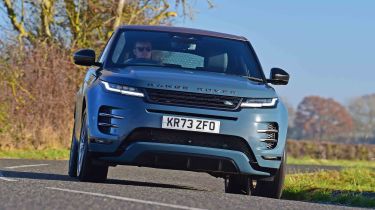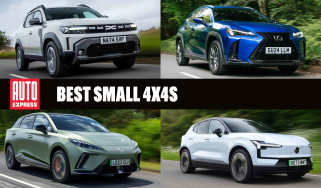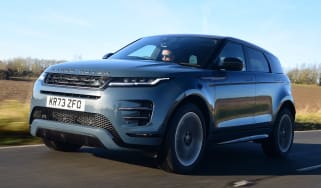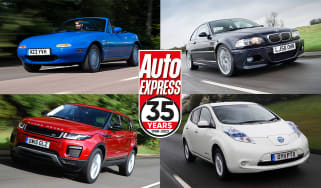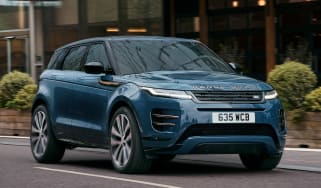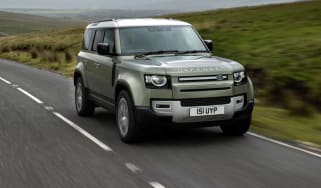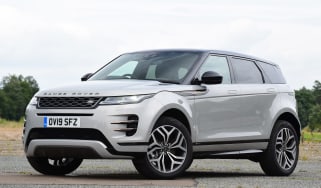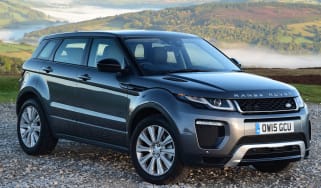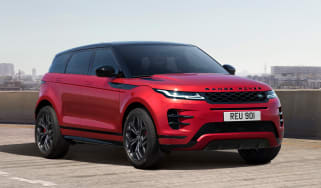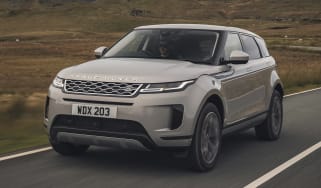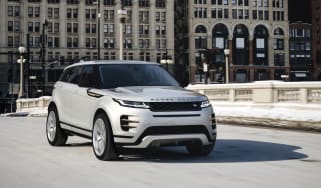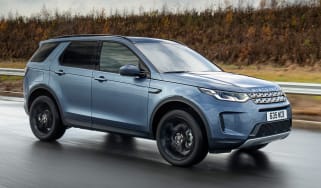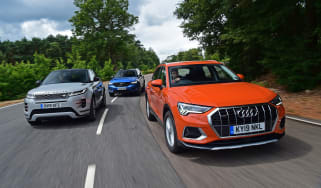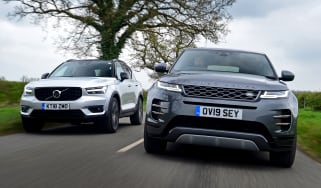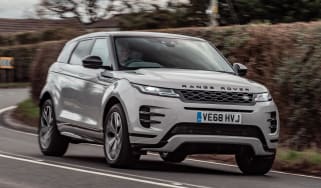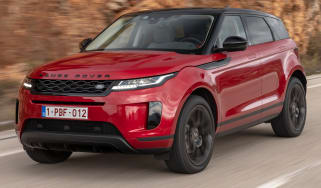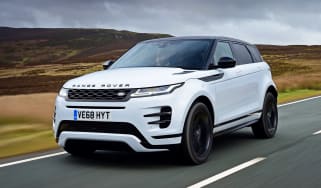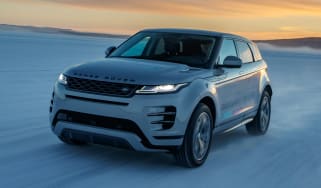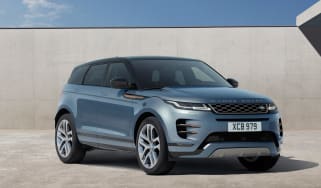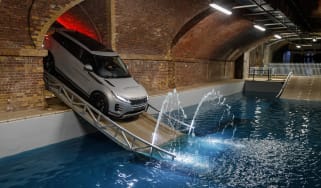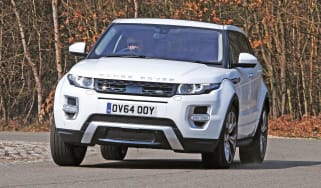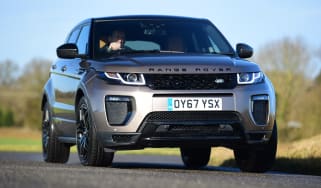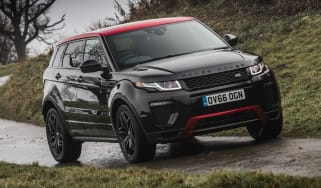Range Rover Evoque review: like a Range Rover, only smaller
The Range Rover Evoque offers great levels of luxury, technology and – perhaps most importantly – style

Although the current Range Rover Evoque doesn’t look too far removed from the first-generation model, it’s added impressive levels of technology, a range of mild and plug-in hybrid powertrains, plus all the refinement and premium touches you’d expect of the larger Range Rover models.
The standard equipment list is generous, while higher-spec models bring full-fat Range Rover appointments. The Benefit-in-Kind savings for business users will make the plug-in hybrid version particularly appealing. We liked the current Evoque so much when it launched, we awarded it the coveted title of best Small Premium SUV at our 2019 New Car Awards.
About the Range Rover Evoque
While some premium compact SUV rivals such as the BMW X1 and X2 offer a more engaging driving experience, the Evoque provides a focus on luxury and comfort that many buyers will prefer. More than a few Evoques will be sold because of their bold looks or the Range Rover name alone, but that’s not to say this car isn’t a viable alternative to favourites like the Audi Q3, Volvo XC40, Mercedes GLA and JLR’s own Jaguar E-Pace.
The Evoque is the smallest Range Rover model that Land Rover produces and in its original form – introduced in 2011 – it was a car that set a precedent as a small yet luxurious SUV aimed squarely at a niche in the market (especially the previous-generation convertible and three-door models).
Used - available now

2019 Land Rover
Range Rover Evoque
78,000 milesAutomaticDiesel2.0L
Cash £12,494
2021 Land Rover
Range Rover Evoque
109,230 milesAutomaticPetrol1.5L
Cash £14,495
2019 Land Rover
Range Rover Evoque
44,840 milesManualDiesel2.0L
Cash £11,995
2020 Land Rover
Range Rover Evoque
29,281 milesManualDiesel2.0L
Cash £18,032The Evoque went on to be one of the British manufacturer’s best-sellers, but after the best part of a decade on sale, the original model was falling behind rivals that it had inspired, including the aforementioned Q3 and GLA. The latest model addresses this, offering evolutionary styling adjustments plus major changes under the skin.
The latest Range Rover Evoque is based on Premium Transverse Architecture (PTA) - which is shared with the Land Rover Discovery and Jaguar E-Pace - essentially a heavily modified version of the old model’s D8 platform. The new car takes up much the same space on the road, but the wheelbase is now longer to help increase rear passenger space – a sticking point for the old car. The new platform brings with it up-to-date 48-volt mild-hybrid electrification and has also paved the way for a plug-in hybrid model to join the range.
The Range Rover Evoque is available with a choice of two petrol and two diesel engines, along with a plug-in hybrid unit. Bar the entry-level D165 diesel that gets front-wheel drive and a six-speed manual gearbox, all versions come with four-wheel drive and a nine-speed automatic gearbox.
There are four equipment levels: S, Dynamic SE, Dynamic HSE, and Autobiography. The top-spec Autobiography trim is only available in combination with the higher-powered mild-hybrid P250 petrol, D200 diesel versions and plug-in hybrid P300e powertrains.
How much does the Range Rover Evoque cost?
Prices currently start from a little over £40,000, with standard kit including a 10-inch touchscreen running Land Rover's Pivi infotainment system, wireless Apple CarPlay and Android Auto smartphone connectivity, a reversing camera, cruise control, lane keep assist and 17-inch alloy wheels. Higher-spec models get an upgraded Pivi Pro infotainment system, a Meridian sound system, leather upholstery and larger rims, among other luxuries.
Engines, performance and drive
Unlike its sportier JLR stablemate, the Jaguar E-Pace, the Range Rover Evoque hasn’t been designed to offer outright thrills to its driver. On a twisty country road, there’s a bit of body lean in tight bends, some slack in the steering at the straight-ahead position, and less front end grip than that of the Jaguar.
The trade-off between body control and ride quality seems well-judged, though, particularly in regular petrol and diesel versions. The extra weight of the battery pack in the plug-in hybrid version can be noticed when driven a little more aggressively, but never to the extent that it feels like it’ll get out of shape.
Once you get the Evoque onto the motorway, it comes into its own. Here, the refinement and comfort levels on offer have taken a big step on from those of the old car; Land Rover’s engineers have made sure that the Evoque is a cosseting cruiser rather than a sports car in an SUV body. In this respect, the Evoque compares favourably with the Volvo XC40, a small SUV with a similar outlook on life. Even on the largest 21-inch wheels, ride quality is excellent.
It’s not terribly likely that any Evoque will venture off-road, but being a Land Rover product, the car does boast impressive skills when the going gets rough. Wading depth has increased from 500mm on the old car to 600mm, while Land Rover’s Terrain Response 2 system can automatically adjust the Evoque’s behaviour to suit the conditions at hand. The supplied Comfort, Sand, Grass-Gravel-Snow and Mud and Ruts settings can each be selected manually too.
0-62mph acceleration and top speed
The entry-level D165 2.0-litre turbocharged diesel produces 161bhp and manages a 0-62mph time of 10.1 seconds. Next is a 201bhp D200 version of that engine that cuts the 0-62mph time to 8.5 seconds.
The entry point into petrol Evoque ownership is the P200, which brings a 2.0-litre turbocharged petrol engine with 197bhp and a 0-62mph time of 8.6 seconds. The P250 ups power to 246bhp, dropping the 0-62mph sprint to 7.6 seconds.
The P300 is no longer on sale, so for those seeking genuine hot-hatch levels of performance, they’ll need the P300e plug-in hybrid. It features a 197bhp 1.5-litre three-cylinder petrol unit driving the front wheels, while at the rear axle, there’s an electric motor with an output of 107bhp, for a combined 305bhp. The PHEV is no slouch, reaching 62mph from a standstill in 6.4 seconds and moving on to a maximum speed of 132mph. It can also run on electric power up to speeds of 84mph.
MPG, CO2 and running costs
Starting with the diesels, the lowest-powered D165 has a quoted WLTP CO2 emissions figure of 157g/km, with average WLTP fuel economy of up to 46.9mpg. The D200 is slightly less efficient, delivering 44mpg and from 168g/km. The latter compares well with rivals, while the former is beaten by the 35 TDI Audi Q3 which can manage 49.6mpg, and has emissions of 152g/km.
The petrol models emit more CO2 and return slightly worse fuel economy figures than their diesel counterparts. The lowest-powered P200 emits 196g/km of CO2, with 32.6mpg on average, while stepping to the P250 sees 199g/km of CO2 with economy of staying the same at 32.1mpg combined.
But, there's also the P300e plug-in hybrid to consider. The Evoque PHEV is able to travel up to 39 miles on electric charge alone, which is superior to that of both the T4 Recharge and T5 Recharge versions of the Volvo XC40, which will only do 29 miles on a charge. The P300e Evoque in S trim reaches a claimed 201.2mpg on the combined cycle and emits 31g/km of CO2.
The P300e Evoque is quite unique in this class in that it offers the capability to be rapid charged. If you find a charger of up to 50kW, you can refill a flat battery in just 30 minutes. We wouldn’t recommend doing that because it’s quite an expensive way of topping up an Evoque, so we’d suggest you do it via a 7kW wallbox charger at home using cheaper overnight electricity. Doing it this way will take about two and a half hours.
However, if you’re not a company car driver, then we’d recommend the mild-hybrid D200 diesel, which seems to offer the best trade-off between performance, economy and emissions.
Insurance groups
The Range Rover Evoque starts in insurance group 25 for the lowest-powered diesel model, climbing through groups 29 to 37 for the D200 and P300e models, respectively.
By contrast, the BMW X2 starts in group 25 in the basic sDrive20i M Sport form, while the performance-orientated X2 M35i has a group 34 rating. The Audi Q3 ranges from group 24 to 32 depending on spec, while the Volvo XC40 sits in groups 23 to 30.
It’s likely that the cachet of that Range Rover badge might have something to do with the Evoque’s higher rating versus its rivals, although there have been some historic issues with Land Rover owners getting insurance coverage for their cars. The brand has been working hard on ways to improve theft resistance, though.
Check if your car needs an MoT and view its complete history with our MoT History Checker...
Depreciation
Our experts predict that the latest Range Rover Evoque should hold onto between 61 - 67 per cent of its value after three years and 36,000 miles, with P300e plug-in hybrid models performing particularly well. The Evoque's excellent depreciation figures far exceed that of the Audi Q3’s 50 per cent, the BMW X1’s 59 per cent and even the Mercedes GLA’s 57 per cent.
To get an accurate valuation on a specific model check out our free car valuation tool...
Interior, design and technology
The latest Range Rover Evoque has received an evolutionary styling update – Land Rover has chosen not to break what worked so well for the original car. The second-generation Evoque is less aggressive, taking inspiration instead from the larger Range Rover Velar, with similar headlights, taillights, and smoothed-off flanks with smart recessed door handles. R-Dynamic models bring a sportier look, adding black and burnished copper detailing plus a body-coloured front bumper.
There are plenty of alloy wheel designs to pick from, ranging from 18 to 21 inches as standard, depending on spec.
A palette of silvers, greys, and blacks makes up most of Evoque’s paint choices, with Corinthian Bronze being a notable exception. Fuji white is the only standard paint, Metallic paint costs £705, premium metallic paint is £970, and a contrasting painted roof costs £650.
Inside, there’s more inspiration from elsewhere in the Range Rover line-up, with a focus on quality materials, clean design and modern infotainment. Overall interior quality has taken a welcome step forward and is now on a par with rivals like the Audi Q3 and BMW X2; it feels slightly ahead of the Volvo XC40, with a greater focus on outright luxury.
However, the separate screen with its easy-to-use dials has gone, merged into the large 11.4-inch touchscreen just like on the Volvo XC40. This is a backwards step in our view because it’s taken something that allowed the Evoque to stand out against its rivals in terms of ease of use, and given us a ‘solution’ that makes it just as hard to adjust the air-con on the move as in those competitors. Plus, the rotary dials had a clever dual purpose that allowed you to adjust the heated front seats with them, too. Now, you’ve got to delve into the screen to do this task as well.
There’s plenty of scope for personalisation inside, with various colour combinations, equipment packs and trim finishes, but you should be prepared to pay handsomely to add these individual touches.
As you might expect, there’s plenty of options packs, too. The £865 optional convenience pack available from the entry-level Evoque S model adds keyless entry, an electric tailgate, and automatic high-beam assistance. There’s also a Comfort pack that adds a UV and infrared reflecting windscreen and a fancier cabin air purification system, gives you a couple of air vents in the back, and configurable ambient interior lighting.
Sat-nav, stereo and infotainment
The Evoque features Land Rover's Pivi Pro on-board tech, which includes a 11.4-inch touchscreen, a DAB digital radio, and wireless Apple CarPlay and Android Auto connectivity. The menu layout is straightforward, and the system can now be upgraded via over-the-air updates. Simply put, Land Rover’s Pivi Pro infotainment system is a quantum leap compared with the old set-up featured in pre-2021-model-year Evoques.
Entry-level S has a basic 140-watt, six-speaker sound system, although this can be upgraded for £630 to the same 400-watt, 11-speaker Meridian sound system that comes as standard with the rest of the range. From Dynamic SE, there is the option of a fancier 650-watt, 14-speaker Meridian surround-sound system. All trim levels come with a wireless phone charging pad.
Practicality, comfort and boot space
The Range Rover Evoque may look much like the old car to the untrained eye, but with just a few Velar-inspired tweaks a near decade-old design has been brought right up-to-date. The car has a longer wheelbase than before to try to free up some more rear passenger space, but that sloping roofline still poses an issue for taller occupants.
In the front, a good driving position is easily found using the standard electrically adjustable front seats and driver memory settings. All versions come with heated front seats.
Rearward visibility isn’t fantastic thanks to that narrow rear window and slim glasshouse, but the optional ClearSight rear-view mirror and 360-degree surround camera system (both standard on Autobiography) help to solve this issue. The former uses a roof-mounted camera to display an uninterrupted, widescreen view of the road behind or – at the push of a button – can be returned to a conventional mirror. Parking sensors front and rear are standard.
There are four generously sized storage bins, a large cubby under the centre front armrest and a useful rubberised tray on the centre console that’ll happily store a phone or wallet – cupholders are located beneath this.
Dimensions and size
The Range Rover Evoque measures 4,371mm long, 1,649mm tall and 1,996mm wide (2,100mm including mirrors). For comparison, the Volvo XC40 is a few millimetres taller and longer, but a shade narrower at 1,910mm wide (excluding side mirrors).
The BMW X2 is lower, measuring just over 1,526mm tall, but it's roughly the same length and width as the Evoque – 4,360mm and 2,098mm including mirrors, respectively.
Leg room, head room & passenger space
There’s enough space in the Evoque to sit one six-footer behind another, but despite a small increase in leg room over the original car, the rear-seat occupant will still feel a little hemmed-in.
Longer journeys may become uncomfortable for adults in the rear as a result; sitting three abreast will also prove pretty cosy as the car tapers towards its rear. The sloping roofline will annoy anyone much over six feet tall. Rivals like the Volvo XC40 and Audi Q3 do a much better job of rear-seat packaging.
A pair of ISOFIX child seat mounts are fitted to the outer positions of the rear bench.
Boot space
In the boot, there is 472 litres on offer with the seats up, which isn’t particularly outstanding compared to rivals. For example, BMW quotes 470 litres for the X2 and Lexus 545 litres for its NX. Thanks to clever packaging, however, the boot space doesn’t change for the plug-in hybrid model.
Fold the seats down, and there’s 1,156 litres of space to play with. The rear seats fold on a 40:20:40 split via a handle in the boot. In true Land Rover tradition, there’s a huge selection of practicality-boosting accessories to add – including seat-back stowage, a rubber mat for the boot and a rear bumper protection cover for when loading.
Towing
The Evoque lives up to its badge when it comes to towing. There’s a choice of an electrically deployable tow bar or a detachable item, along with Land Rover’s Advanced Tow Assist, which helps demystify the dark art of reversing a trailer using the rear view camera.
All Evoque models can tow an unbraked trailer of up to 750kg; choose an automatic gearbox and diesel engine combination, and there’s up to 2000kg of braked trailer towing ability. The entry-level diesel with two-wheel drive and a manual gearbox is limited to 1,600kg as are the plug-in hybrid models. Maximum tow ball weight across the range is 100kg.
If you need more towing capacity, you’ll need the four-wheel drive 40 TDI Audi Q3, which can pull up to 2,200kg.
Reliability and safety
The Evoque was tested by Euro NCAP in 2019 and achieved a maximum five-star overall rating, with a 94 per cent score for adult occupant safety and 87 per cent for child passenger protection.
All models come as standard with a reversing camera, front and rear parking assistance, lane-keep assist, automatic emergency braking (AEB), a driver condition monitor and cruise control with a speed limiter.
Safety kit includes adaptive cruise control, an intrusion sensor, child locks, six airbags, a deployable bonnet with pedestrian airbag, and a traffic sign recognition with an adaptive speed limiter. Dynamic SE models and above get blind spot assistance and a rear traffic monitor.
Unfortunately, the Evoque finished even lower than last time in the 2023 Driver Power owner satisfaction survey, dropping from 53rd position (out of 75 cars) down to 72 (still out of 75 cars). Reliability, cost of ownership, and exterior bodywork quality were all areas of concern, as was the infotainment system. The latter has been improved in later cars, so hopefully, this part of the scoring will get better.
Owners' feedback about the brand is showing signs of improvement, moving up from 22nd position (out of 29 brands) in 2021 to 14th spot in 2022 and the same spot in 2023 – ahead of premium automakers such as BMW, Audi and Mercedes.
Warranty
The Evoque is subject to the same competitive warranty as other Land Rover products: three years with unlimited mileage. This is the same as you get with the Jaguar E-Pace or BMW X1 or X2, but beats the standard three-year/60,000-mile warranties from Audi and Lexus.
However, the battery pack in P300e models is only guaranteed for six years or 60,000 miles, which is a little stingy considering the vast majority of its plug-in hybrid rivals have cover for up to eight years or 100,000 miles.
Servicing
Every Evoque has a service schedule of two years or every 21,000 miles – whichever comes soonest. Land Rover includes a two-year parts warranty on all its servicing and maintenance work, and offers service plans for its cars. Prices are fixed at a sign-up price for their whole duration, with buyers given the choice of spreading the cost or making a one-off payment.
Used and nearly new
The Evoque is Land Rover's best-selling model, so buyers looking for a decent used example should be spoilt for choice. Stylish and good to drive, the compact SUV ably represents the Land Rover brand, offering a more affordable entry point into ownership than many of its bigger, more luxurious siblings.
It may not be the most practical SUV and reliability can sometimes be an issue, but it offers tremendous kerb appeal and will suit families who want a comfortable cruiser with a little added sophistication
Range Rover Evoque history
Range Rover Evoque Mk1: 2011-2018
Based on the 2008 Land Rover LRX Concept, the first generation Evoque was launched in 2011 with three- and five-door models available. It won our Car of the Year award during its debut year, while its impressive engineering has meant even older models still look modern and fresh today.
Both petrol and diesel-engined Evoque's should be in good supply, while you might want to keep an eye out for the facelifted car which arrived in 2015 with updated exterior styling, more efficient engines, revised tech and improved safety features. And, if you're after top down, wind-in-your-hair driving fun, but with that familiar high-riding SUV driving position, there is the ultra-rare convertible model to consider. Read our full Mk1 Range Rover Evoque buyer’s guide here…

